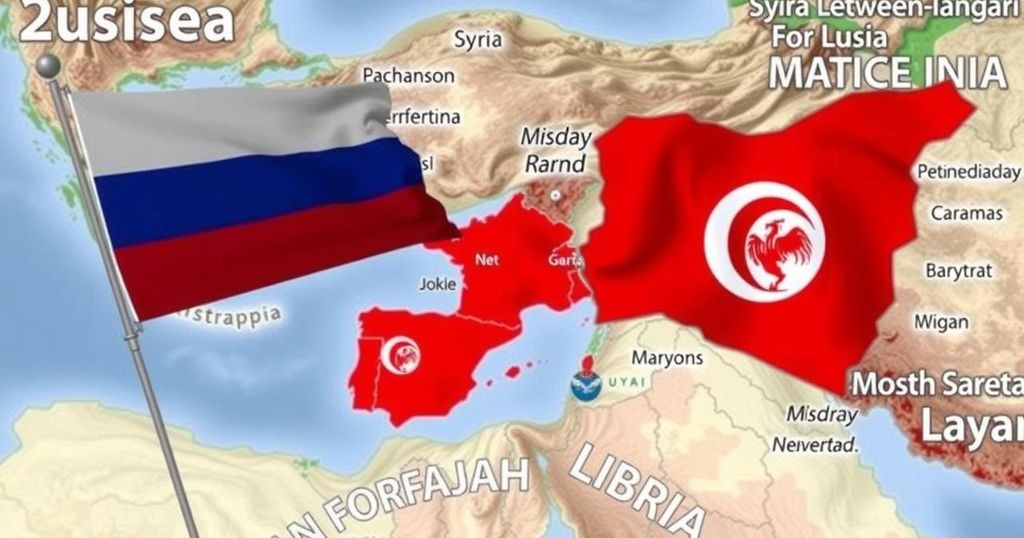As Russia reconsiders its presence in Syria, analysts speculate it may shift military resources to Libya, a strategic alternative. This potential relocation raises concerns about the stability of the already fragmented Libyan political landscape, particularly regarding the power dynamics involving Khalifa Haftar and implications for NATO. The evolving situation underscores Russia’s ambitions in the Mediterranean and its broader impact on regional geopolitics.
In the aftermath of Syria’s complex civil war, analysts assert that Russia may redirect its military resources towards Libya as it grapples with potential losses in its strategic influence in the region. Although Russia’s footprint in Syria has been instrumental in propping up Bashar al-Assad’s regime through military and diplomatic support, recent developments suggest an ambiguous future for Russian bases in Syria. As the landscape shifts, experts contend that Libya poses a viable alternative, yet the repercussions of increased Russian military presence in a fragile Libyan context raise critical concerns regarding regional stability, particularly given Libya’s ongoing power struggles.
Over the past decade, Russia has worked diligently to solidify its influence throughout the Mediterranean and Africa. Key military installations, such as Khmeimim airbase and the naval facility in Tartous, were paramount to this endeavor. However, the prospect of losing these strongholds necessitates seeking alternatives—and Libya embodies such an opportunity. Nevertheless, the implications of a Russian buildup in Libya would significantly affect the already precarious political dynamics within the country, where two rival governments struggle for legitimacy.
The situation in Libya is further complicated by the existence of two competing governments, neither of which is willing to relinquish power until national elections can be conducted. Recent negotiations facilitated by the United Nations aimed to resolve the political standoff, though there remains skepticism that these discussions will yield substantive results, especially if Russian influence in the country escalates. Analysts express concerns that a robust Russian military establishment could empower Khalifa Haftar, the eastern commander, allowing him to dictate terms and disrupt the fragile progress towards national reconciliation.
Currently, the geopolitical landscape in Libya is precarious, influenced by the interplay of international actors. The potential for heightened Russian presence near NATO’s southern flank raises alarms about broader implications for migration routes, energy supplies, and trade corridors. Analysts conclude that Russia’s maneuvers could effectively transform Libya into a hybrid warfare platform against Western interests. This evolving situation necessitates close monitoring as the repercussions for Libya and the broader Mediterranean region could be profound.
The article explores Russia’s military and geopolitical strategies in the Middle East and North Africa, primarily focusing on the shifting dynamics following the Syrian civil war and the ongoing instability in Libya. Russia has invested considerable effort into establishing a strategic footprint in Syria, enhancing its military capabilities through key bases that bolster its influence in the region. With Syria’s future seemingly uncertain under a new administration, analysts are examining the implications of Russia potentially redirecting its military assets to Libya as an alternative platform, recognizing the complexities inherent in both regions.
This analysis highlights the potential for a significant Russian military presence in Libya as a consequence of shifting strategies post-Syria. The geopolitical maneuverings undertaken by Russia could enable it to reinforce its influence in North Africa while exacerbating existing tensions in a politically fractured Libya. The unpredictability of the situation poses risks not only for Libya but also for the stability of Western interests in the Mediterranean and beyond, warranting careful scrutiny and responsiveness from international stakeholders.
Original Source: www.aljazeera.com







